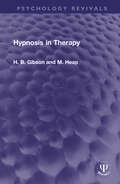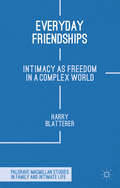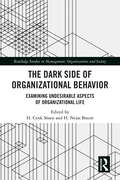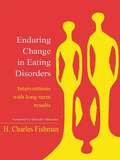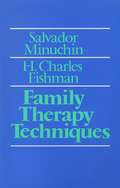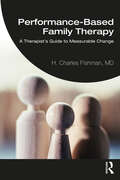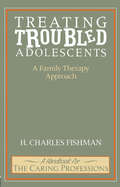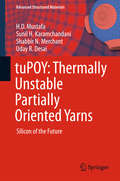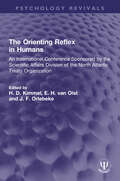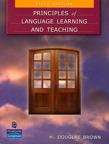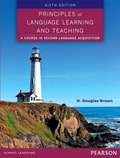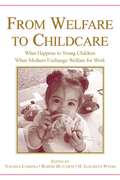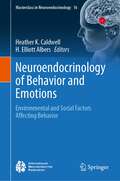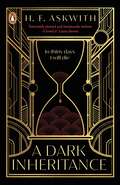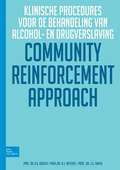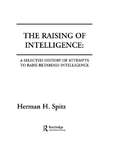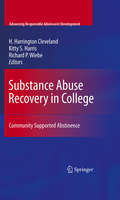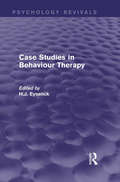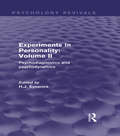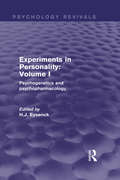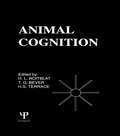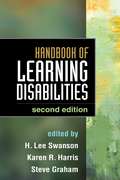- Table View
- List View
Hypnosis in Therapy (Psychology Revivals)
by H. B. Gibson M. HeapOriginally published in 1991, this book covers a comprehensive range of the applications of hypnotic techniques in therapy for psychological disorders, and medical conditions where such techniques are a valuable adjunct. In the years before publication psychologists, medical doctors, dentists and allied professional workers had come to make increasing use of hypnosis in their work, and there was a considerable amount of relevant research literature available in journals. Such literature is reviewed, and served as a practical guide for professionals at the time.The book begins by explaining what is meant by hypnosis today, and traces its historical background. Some fundamental questions such as individual differences in susceptibility to hypnosis are discussed in relation to therapy. Separate chapters are devoted to the key topics of behaviour therapy, different forms of psychotherapy, psychosomatic medicine, the treatment of pain, and applications in medical and surgical procedures. The modern status of hypnotic techniques in obstetrics and in dentistry is reviewed, and a separate chapter on the use of hypnosis with children will be of special interest to educational and clinical psychologists. A final chapter reviews the use of hypnosis by various professions and para-medical disciplines, and discusses the possible abuses that may arise both through unqualified people seeking to practise "hypnotherapy", and by professionals acting outside their proper range of competence.
Everyday Friendships: Intimacy as Freedom in a Complex World (Palgrave Macmillan Studies in Family and Intimate Life)
by H. BlattererThis book conceptualises the lived experience of intimacy in a world in which the terms and conditions of love and friendship are increasingly unclear. It shows that the analysis of the 'small world' of dyads can give important clues about society and its gendered makeup.
Language Assessment: Principles And Classroom Practices
by H. BrownLanguage Assessment: Principles and Classroom Practices is designed to offer a comprehensive survey of essential principles and tools for second language assessment. Its first and second editions have been successfully used in teacher-training courses, teacher certification curricula, and TESOL master of arts programs. As the third in a trilogy of teacher education textbooks, it is designed to follow H. Douglas Brown's other two books, Principles of Language Learning and Teaching (sixth edition, Pearson Education, 2014) and Teaching by Principles(fourth edition, Pearson Education, 2015). References to those two books are made throughout the current book. <P><P> Language Assessment features uncomplicated prose and a systematic, spiraling organization. Concepts are introduced with practical examples, understandable explanations, and succinct references to supportive research. The research literature on language assessment can be quite complex and assume that readers have technical knowledge and experience in testing. By the end of Language Assessment, however, readers will have gained access to this not-so-frightening field. They will have a working knowledge of a number of useful, fundamental principles of assessment and will have applied those principles to practical classroom contexts. They will also have acquired a storehouse of useful tools for evaluating and designing practical, effective assessment techniques for their classrooms.
The Dark Side of Organizational Behavior: Examining Undesirable Aspects of Organizational Life (Routledge Studies in Management, Organizations and Society)
by H. Cenk Sözen H. Nejat BasımThe Dark Side of Organizational Behavior aims to gather all the micro and meso level topics about the dark side of organizations that may guide management practitioners, researchers, and students. The history before the modern human civilization is full of multiple types of conflicts, wars, struggles and violence. Modernization project has constructed a desired reality of human being and has somehow concealed the dark side of human interactions. Through this outlook, this book explores the realities of the dark side of organizations and how these realities may have the potential to change previous assumptions about business life. The field of Organizational Behavior is dominated by the positive aspects of the business life, but conflict, war, struggle, and violence have always been a part of history. It is not possible to isolate organizational participants from negative emotions like hostility, dislike, hate, jealousy, rage, and revenge. A manager may devote most of their time to cope with conflicts, deviant behaviors, ambitious individuals, gossips, and dysfunctional rivalry among employees. It is evident that negative events and interactions among employees cost more time and energy for a manager than the positive side of organizational life. Therefore, exploring the realities of the dark side of organizations may have the potential to change previous assumptions about business life. This book will be of interest to researchers, academics, practitioners, and advanced students in the fields of organizational studies and behavior, human resource management, employment relations, and organizational psychology.
Enduring Change in Eating Disorders: Interventions with Long-Term Results
by H. Charles FishmanEnduring Change in Eating Disorders provides a unique perspective on the successful treatment of eating disorders, which are among the most debilitating and recalcitrant psychiatric diseases. Unique in the field, this book details effective Structural Family Therapy with qualitative follow-ups of up to 20 years. A practical approach providing concrete tools to the clinician to creating change that holds over time with bulimia, anorexia, and compulsive overeating. The text draws on cases from the author's practice of over twenty-five years and follows his approach in the theoretical tradition of Intensive Structural Family Therapy (IST). Chapters discuss the nature and significance of eating disorders, a review of current treatment approaches, and the importance of the family in the therapeutic process. Cases of eating disorders in youths and adults are provided as well as instances of bulimia, anorexia, and compulsive overeating. Three appendices provide the reader with information regarding the scientific basis of the IST model, the effectiveness of the approach in treating conditions other than eating disorders and preventing eating disorders.
Family Therapy Techniques
by Salvador Minuchin H. Charles FishmanA master of family therapy, Salvador Minuchin, traces for the first time the minute operations of day-to-day practice. Dr. Minuchin has achieved renown for his theoretical breakthroughs and his success at treatment. Now he explains in close detail those precise and difficult maneuvers that constitute his art. The book thus codifies the method of one of the country's most successful practitioners.
Performance-Based Family Therapy: A Therapist’s Guide to Measurable Change
by H. Charles FishmanIn this groundbreaking book, Charles Fishman uniquely incorporates and develops results-based accountability (RBA) into the framework of structural family therapy. Collaborating with the founder of RBA, Mark Friedman, this approach aims to transform the field of family therapy by allowing clinicians to track performance effectively and efficiently with their clients. The book begins by reviewing the historical foundations of family therapy and evaluates why challenges in the field, alternative methods, and the reliance on evidence-based medicine (EBM) have meant that family therapy may not have flourished to the extent that many of us expected. It then explores how RBA can be integrated into intensive structural therapy (IST), with chapters examining how RBA can be applied in context, such as in treating eating disorders, supervision, and how it can be used to transform the professional’s clinical contexts. Relevant and practical, the book also introduces the community resource specialist to help in the treatment of socially disadvantaged families, as well as practical appendices and "tracking tools" to empower clinicians to track their data and choose treatment models that obtain best outcomes. This new approach offers transparent and measurable outcomes for both clinicians and training family therapists, lending a helping hand in making family therapy the gold standard in psychotherapy. It is essential reading for undergraduate and graduate students of family therapy, course leaders, and all clinicians in professional contexts, such as social workers, psychotherapists, and marriage, couple, and family therapists.
Treating Troubled Adolescents: A Family Therapy Approach
by H. Charles FishmanFirst Published in 2017. Routledge is an imprint of Taylor & Francis, an Informa company.
tuPOY: Thermally Unstable Partially Oriented Yarns
by H. D. Mustafa Sunil H. Karamchandani Shabbir N. Merchant Uday B. DesaiThis book provides a new direction in electronics researchwith the invention of a new material tuPOY, which changes our perception ofdeveloping electronics. Evolving on a relatively underplayed phenomenon ofstatic electricity in scientific exploration and application, tuPOY upholds thepotential to rival both silicon and metals as electronics of the future. Devices made of tuPOY present a new emblem to the technological world, where wecould envision our electronic paraphernalia from a completely differentperspective. A computer the size of a big wall, which could be neatly foldedand kept in our pockets when not in use and laundered on a regular basis, can beimagined possible with this invention. The concept, manufacturing process,physics and uses of tuPOY as the next generation material of electronics isdescribed in this book. The book covers the production process of tuPOY and goes onto conceptual advancement from manipulating the sensing, radiating andprocessing properties of tuPOY. Theoretical modelling of tuPOY is characterizedby steady-state equations exploiting interchanges based on the latticekinetics, which mathematizes an Interchange Phenomenon intuPOY. The numerical manifestations calibrate mathematically, tuPOY's responseto any external physical impetus such as charge, heat or energy flow. The book validates the sensing properties and theoreticalmodel by designing a tuPOY sensor which can be used in a plethora ofapplications. A novel microstrip antenna is designed by amalgamation of tuPOY,raw silk and polynylon composites to experimentally verify the radiationproperties of the new material. The conduction properties are verified by drawingfibres of tuPOY and using them as wires and connectors in electronics. A PowerGenerating Unit (PGU) is designed with tuPOY as its primary element. This is afirst of its kind PGU that scavenges power from thermal energy presenting a newdimension in operational power dynamics. Overall this book should be of interest to a wide range of readersranging from researchers, scientists, developers, manufacturers, engineers,graduate students and anyone who has satiety to think differently.
The Orienting Reflex in Humans: An International Conference Sponsored by the Scientific Affairs Division of the North Atlantic Treaty Organization (Psychology Revivals)
by H. D. Rimmel; E. H. van Olst; J. F. OrlebekeOriginally published in 1979, the world’s leading researchers contributed chapters describing their work on the orienting reflex in humans. The contributions, at the time current and comprehensive, in a sense that each facet of contemporary research was represented, address the orienting reflex, now recognized as a fundamental component of human learning and cognitive function. The authors contributing to this volume emphasize both theoretical and methodological issues, as well as present more empirical research. Here is a volume that spans all current work on the orienting reflex in humans, both basic and applied, from the laboratory as well as clinical data, and which would be of immense interest to psychologists, psychophysiologists, psychiatrists, physiologists, and all others interested in this fascinating topic.
Principles Of Language Learning And Teaching
by H. Douglas BrownPrinciples of Language Learning and Teaching, Fifth Edition, by H. Douglas Brown, is the classic second language acquisition text used by teacher education programs worldwide. Principles introduces key concepts through definitions of terms, thought-provoking questions, charts, and spiraling. New Classroom Connections encourage students to consider the implications of research for classroom pedagogy. An up-to-date bibliography and new glossary provide quick access to important works and key terminology in the field. The fifth edition takes a comprehensive look at foundations of language teaching through discussions of the latest research in the field, including: * Vygotsky's and Bakhtin's theories * Thorndike's law of effect * error treatment, noticing, recasts * intercultural communication * language policy and politics * corpus linguistics *hot topics in SLA * connectionism and emergentism * flow theory, willingness to communicate * strategies-based instruction * contrastive rhetoric * attribution theory, self-efficacy * output hypothesis Also by H. Douglas Brown: Teaching by Principles: An Interactive Approach to Language Pedagogy Language Assessment: Principles and Classroom Practices Strategies for Success: A Practical Guide to Learning English
Principles of Language Learning and Teaching
by H. Douglas BrownThe sixth edition of Principles of Language Learning and Teaching offers new ways of viewing and teaching second language acquisition (SLA) based on the latest research. Providing a comprehensive overview of the theoretical viewpoints that have shaped language teaching today, the text explains the pedagogical relevance of SLA research in reader-friendly prose. <P><P> The new edition of this classic text, used by teacher-education programs worldwide, reflects the most recent themes in SLA research, updated references, and a summation of current issues and perspectives. The text is available in print and eText formats.
Principles of Language Learning and Teaching (Fifth Edition)
by H. Douglas BrownPrinciples of Language Learning and Teaching, Fifth Edition, by H. Douglas Brown, is the classic second language acquisition text used by teacher education programs worldwide. Principles introduces key concepts through definitions of terms, thought-provoking questions, charts, and spiraling. New Classroom Connections encourage students to consider the implications of research for classroom pedagogy. An up-to-date bibliography and new glossary provide quick access to important works and key terminology in the field. The fifth edition takes a comprehensive look at foundations of language teaching through discussions of the latest research in the field, including: * Vygotsky's and Bakhtin's theories * Thorndike's law of effect * error treatment, noticing, recasts * intercultural communication * language policy and politics * corpus linguistics *hot topics in SLA * connectionism and emergentism * flow theory, willingness to communicate * strategies-based instruction * contrastive rhetoric * attribution theory, self-efficacy * output hypothesis Also by H. Douglas Brown: Teaching by Principles: An Interactive Approach to Language Pedagogy Language Assessment: Principles and Classroom Practices Strategies for Success: A Practical Guide to Learning English
From Welfare to Childcare: What Happens to Young Children When Mothers Exchange Welfare for Work?
by H. Elizabeth Peters Natasha J. Cabrera Robert HutchensAlthough federal and state support for childcare has increased dramatically in response to welfare work requirements, low-income families are still facing difficulties balancing work and family obligations. There is wide variation across states in the strictness of welfare work requirements and in the generosity of childcare support. In addition, the level of co-payments required and the flexibility to use subsidies for informal modes of childcare differ across states, leading families to make different childcare and employment choices. The purpose of From Welfare to Childcare is first to describe what changes occurred in childcare following the 1996 welfare reform legislation, and then to analyze how federal welfare and subsidy policies influence the availability, accessibility, and quality of childcare arrangements for single mothers with young children. National in scope, it focuses on how the reforms influence the way that children are cared for when their mothers leave welfare and enter the workforce. This book is suitable for national, state, and local policymakers, non-profit organizations that study and attempt to influence public policy, and scholars interested in family and social policy issues. It can be used as a text in graduate level courses on welfare, poverty, and children and public policy.
Neuroendocrinology of Behavior and Emotions: Environmental and Social Factors Affecting Behavior (Masterclass in Neuroendocrinology #16)
by Heather K. Caldwell H. Elliott AlbersThis volume highlights current research on how the neuroendocrine system helps to influence emotional states and ultimately behavioral output. Social relationships and context-appropriate behavioral responses are important for the survival of most vertebrate species. These relationships can range from transient social interactions to strong social bonding between sexual partners and social behaviors can be observed and evaluated from the individual- to the group-level. Further, behavioral output is shaped by complex interactions between the physical environment, genetics, experience, and context, and are often modulated by the neuroendocrine system. In this book, experts in the field will provide a sweeping look at novel research in the neuroendocrine regulation of important behaviors ranging from parental care to social homeostasis, with a focus on comparative studies across vertebrate species. The first part of the book is dedicated to theneuroendocrinology of relationships, including the coordination of acoustic signals in songbirds, the complexity of social relationships in primates, and cooperation and parenting in humans. The second part of the book focuses on social behaviors and provides some insights into their regulation, including the neuroendocrine regulation of maternal behavior in rodents, the roles of oxytocin and vasopressin in the modulation of sex-specific social behavior, the interactions between adult neurogenesis, the neuroendocrine system and social behavior, and a consideration of neuroendocrine influences on reproductive decision making across species. The book concludes with a section on environmental influences on neuroendocrine systems underlying behavior, including how social isolation and endocrine disrupting chemicals affect the neuroendocrinology of behavior and emotions. Given its breadth, this volume is appropriate for undergraduate students, graduate students, postdoctoral researchers, and established researchers who are interested in neuroendocrinology and behavior. This is the sixteenth volume in the International Neuroendocrine Federation (INF) Masterclass in Neuroendocrinology series, which aims to illustrate the highest standards and highlight the latest technologies in basic and clinical research and aspires to provide inspiration for further exploration into the exciting field of neuroendocrinology.
A Dark Inheritance
by H. F. Askwith'A powerful, heart-racing story of family, fate, and writing your own destiny. Intricately plotted and luminously written - I loved it.' Laura Steven, author of The Society for Soulless GirlsOnce I had four brothers. Three of them are dead. I am next.Felix Ashe is sure of only one thing. In thirty days, on his eighteenth birthday, he will die. He might be the only one convinced of this, but the gruesome deaths of his three brothers before him seem to point to only one thing: a curse, one doomed to stop anyone inheriting his family's incredible fortune.Felix doesn't care about money, or himself, particularly. It's hard to have a stake in the future when you know you haven't got one. But he does care about his little brother Nick, very much. And when an opportunity to break the curse appears to present itself, it's impossible not to heed its dark call.Soon long-buried secrets will take Felix to the darkest underbelly of Jazz-Age New York, to the far-flung wilds of the Yorkshire moors and back again. And bound to everything is a deadly secret society who will either be Felix's downfall . . . or his one chance at redemption.The Great Gatsby meets The Inheritance Games in this gloriously twisty thriller, perfect for fans of #DarkAcademia and Leigh Bardugo's Ninth House
Community Reinforcement Approach
by H. G. Roozen R. J. Meyers J. E. SmithDeze uitgave beschrijft op beknopte wijze verschillende procedures op het gebied van de Community Reinforcement Approach. Voor iedere procedure wordt verwezen naar het Handboek voor de behandeling van alcoholverslaving als naslagwerk. Dit werk geeft veel achtergrondinformatie over de klinische praktijk van de CRA, de theoretische grondslagen, en de wetenschappelijke onderbouwing. Sinds de verschijning van dit handboek raakt CRA in toenemende mate ingeburgerd in de klinische behandelpraktijk van de Nederlandse verslavingszorg, geestelijke gezondheidszorg en forensische psychiatrie. CRA maakt gebruik van operante leerprincipes en benadrukt de positieve aspecten in het leven van de verslaafde om duurzame gedragsveranderingen te realiseren. CRA probeert waarde en integriteit toe te voegen in gedragstherapeutische termen. Voor veel hulpverleners is het een plezierige manier van werken met soms toch moeilijke patiëntpopulaties. Dit boek omvat een handzame en praktische opzet waarbij voor iedere CRA-procedure een systematische weergave van de werkwijze wordt beschreven met een checklist om de behandelintegriteit te kunnen toetsen. Daarnaast zijn de relevante CRA-formulieren terug te vinden die telkens binnen de procedure(s) worden gebruikt. Hierdoor is de CRA aanpak direct toepasbaar in de dagelijkse hulpverlening. Het boek is toegesneden op de toepassing in een poliklinische setting, maar de aanpak kan evenwel, al dan niet met aanpassingen, toegepast worden in een andersoortige setting zoals een deeltijd of een klinische omgeving. Het wordt aanbevolen voor zorgprofessionals uit de klinische praktijk, zoals psychiaters, artsen, psychologen, verpleegkundigen, agogen en andere professionals die actief zijn in de zorg.
The Raising of Intelligence: A Selected History of Attempts To Raise Retarded Intelligence
by H. H. SpitzThe history of attempts to raise the intelligence of mentally retarded individuals is wrought with controversy. Spanning the years from 1800 to the present, this book offers a critical review of the methods and philosophy behind these efforts. A fascinating contribution to the long-standing debate on the malleability of intelligence and the influence of heredity and environment.
Substance Abuse Recovery in College
by Kitty S. Harris Richard P. Wiebe H. Harrington ClevelandSubstance Abuse Recovery in College explains in authoritative detail what collegiate recovery communities are, the types of services they provide, and their role in the context of campus life, with extended examples from Texas Tech University's influential CSAR (Center for the Study of Addiction and Recovery) program. Using data from both conventional surveys and end-of-day daily Palm Pilot assessments as well as focus groups, the book examines community members' experiences. In addition, the importance of a positive relationship between the recovery community and the school administration is emphasized. Topics covered include: The growing need for recovery services at colleges. How recovery communities support abstinence and relapse prevention. Who are community members and their addiction and treatment histories. Daily lives of young adults in a collegiate recovery community. Challenges and opportunities in establishing recovery communities on campus. Building abstinence support into an academic curriculum. This volume offers clear insights and up-close perspectives of importance to developmental and clinical child psychologists, social workers, higher education policymakers, and related professionals in human development, family studies, student services, college health care, and community services.
Case Studies in Behaviour Therapy (Psychology Revivals)
by H. J. EysenckOriginally published in 1976 and on the basis of extended case histories, Eysenck showed how experts dealt with problems which arose in the course of behaviour therapy. It showed how they formulated hypotheses about causation and treatment, and used these to structure the methods employed; and how they changed their hypotheses when treatment showed them to have been mistaken. The prime aim was to demonstrate the complexities involved in even apparently simple cases, and the need to base treatment on a proper understanding of the dynamics of the case. All the articles were specially written for this book, the purpose being to underline the need to state the dynamics of a case in such a form that they could be used as hypotheses leading to specific treatment recommendations. The hypotheses were tested by the success or failure of the treatment, thus making the treatment of individual patients a proper experimental procedure. Behaviour therapy emphasises the fundamental importance of the outcome problem and only experience can teach the behaviour therapist just how this interplay of theory formulation and design of location, evaluation of effect and changes in theory, works in actual practice. The book will help those engaged in this type of therapy to understand the process better, and to gain a quicker mastery of the technique.
Experiments in Personality: Psychodiagnostics and psychodynamics (Psychology Revivals)
by H. J. EysenckOriginally published in 1960, the two volumes of Experiments in Personality report a number of experiments in psychogenetics, psychopharmacology, psychodiagnostics, psychometrics and psychodynamics, all of which formed part of the programme of research which had been developing from the late 1940s at the Maudsley Hospital. Presenting the studies together in a book, rather than the more usual route of journal articles, was itself felt to be an experiment at the time, especially given the wide area covered. The decision was deliberate because all the studies reported formed part of a larger whole, which would have been lost if published separately. Volume II looks at psychodiagnostics, psychodynamics and psychometrics.
Experiments in Personality: Psychogenetics and psychopharmacology (Psychology Revivals)
by H. J. EysenckOriginally published in 1960, the two volumes of Experiments in Personality report a number of experiments in psychogenetics, psychopharmacology, psychodiagnostics, psychometrics and psychodynamics, all of which formed part of the programme of research which had been developing from the late 1940s at the Maudsley Hospital. Presenting the studies together in a book, rather than the more usual route of journal articles, was itself felt to be an experiment at the time, especially given the wide area covered. The decision was deliberate because all the studies reported formed part of a larger whole, which would have been lost if published separately. Volume I looks at psychogenetics and psychopharmacology.
Animal Cognition (Comparative Cognition and Neuroscience Series)
by H. L. Roitblat H. S. Terrace T. G. BeverFirst published in 1984. With this volume we initiate a series of books in comparative cognition and neuroscience. The presentations at the Harry Frank Guggenheim Conference, June 2-4, 1982, out of which the present volume grew, showed that this field of enquiry into cognitive functioning and its neural basis had reached maturity.
Utopiates
by H. Lark HallLSD belongs to the class of drugs that, taken orally, can produce dramatic psychological experiences. There appears to be a wide range of response to LSD. Commonly there are reports of sensory changes, extreme variations in strong emotions, new perspectives about oneself, changed views of-and feelings toward-other people, changes from prior chronic situations, shifts in interest, and new integrative experiences which may be delusional or mystically religious.The contributors to this volume, which was first published in 1965, accent the culture that embraces LSD. They marshal evidence that the effects of any drug tend to be in keeping with the values of the culture or subculture in which it is used, or if the user's wish is to express rebellion or dissidence, the effect will stand in opposition to prevailing values. The same substance has different effects in different cultures; and the same effects may be achieved with different substances. In the past, alcohol was hailed in much the same way as LSD. There was even a time when coffee was brought under the same kind of proscription that today holds for opiates.Such conflicts in values and morals continue with a new generation of drugs, which makes this volume especially relevant. What could be done was an open issue at the time this book was first published. The contributors encourage citizens, scientists, physicians, mystics, ministers, lawmakers and lawmen, drug users and abstainers, to learn and to think more about the phenomena of drug use and to develop plans for social action. This volume stresses the need to develop a policy regarding the handling of classes of drugs and drug users. Although LSD has fallen in favor as a drug of choice for those interested in experimentation, the issues raised in this volume remain with us.
Handbook of Learning Disabilities, Second Edition
by Steve Graham Karen R. Harris H. Lee SwansonWidely regarded as the standard reference in the field, this comprehensive handbook presents state-of-the-art knowledge about the nature and classification of learning disabilities (LD), their causes, and how individuals with these difficulties can be identified and helped to succeed. Best practices are described for supporting student performance in language arts, math, and other content areas. Contributors also identify general principles of effective instruction and review issues in service delivery within response-to-intervention (RTI) frameworks. The book critically examines the concepts and methods that guide LD research and highlights important directions for future investigation. New to This Edition: *Incorporates key advances in identifying and remediating LD, with particular attention to the role of RTI. *Chapters on social cognitive, behavioral genetic, and neurobiological aspects. *Chapters on adolescents and adults with LD. *Chapters on spelling instruction, history instruction, and classroom technology applications. *Chapter synthesizing 21st-century advances in LD research methods, plus chapters on advanced statistical models, single-case designs, and meta-analysis.
